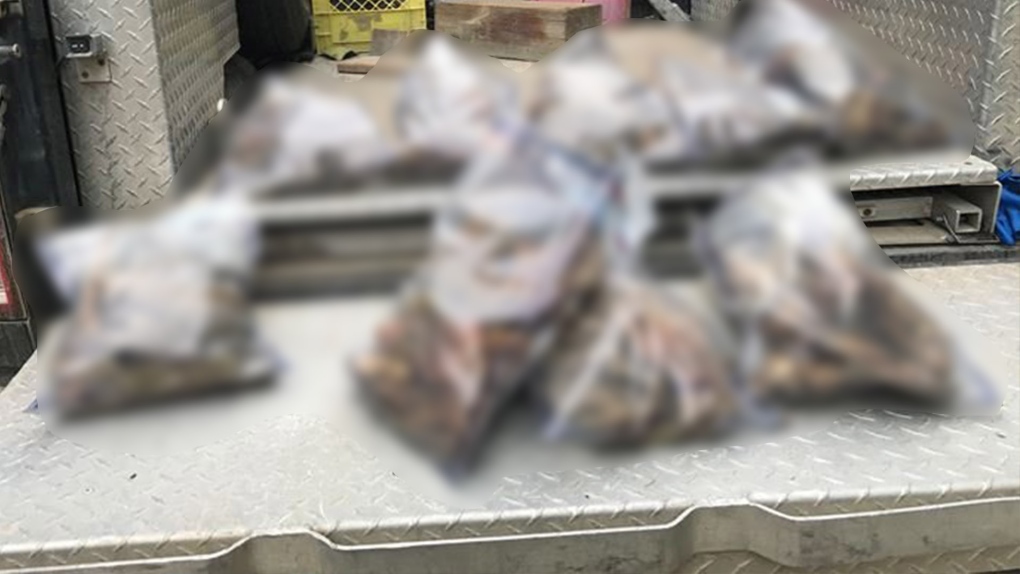Discarded bear paws came from taxidermy business, B.C. conservation officers say
 (Blurred) Bear paws and other animal remains are seen after being collected by the B.C. Conservation Officer Service in May 2021. (Handout)
(Blurred) Bear paws and other animal remains are seen after being collected by the B.C. Conservation Officer Service in May 2021. (Handout)
Authorities have confirmed a heap of skinned bear paws and other wildlife parts found discarded in B.C.'s Shuswap region last year came from a taxidermy business, and were not related to black market bear trafficking.
The remains were discovered along a forest service road in the Anglemont Mountain area in May 2021, raising concerns in the community about where they had come from.
The B.C. Conservation Officer Service investigated and ultimately determined the wildlife parts had previously been in the lawful possession of a taxidermist.
"The waste was unlawfully dumped after it inadvertently fell out of the back of the individual's truck while travelling," the BCCOS said in a Facebook post Thursday.
Because of the circumstances, the offence only would have warranted a $115 littering fine under the Environmental Management Act, officials said.
But instead of paying the fine, the person responsible made a "substantial voluntary donation" to the Little Shuswap Lake Band's Water Stewardship Guardian Program, which operates in the area when there wildlife parts were discovered.
The B.C. Conservation Officer Service did not specify the amount of the donation, but said it "far exceeds the fine amount."
"We understand the public is passionate about wildlife and recognize this scene was alarming and concerning to many Indigenous communities, British Columbians and others," Acting Chief Conservation Officer Cam Schley said in the post.
"We hope the conclusion of this investigation, which confirms this was not related to poaching, helps alleviate distress and bring closure to the public."
The BCCOS noted that taxidermists and hunters alike are required to properly dispose of wildlife parts, to avoid causing unnecessary alarm. Illegally dumping remains can also attract dangerous wildlife, and potentially create unnecessary conflicts with humans in the area.
CTVNews.ca Top Stories

Jubilation and gunfire as Syrians celebrate the end of the Assad family's half-century rule
Syrians poured into streets echoing with celebratory gunfire on Sunday after a stunning rebel advance reached the capital, putting an end to the Assad family's 50 years of iron rule but raising questions about the future of the country and the wider region.
Canada 'falling so consistently short' on defence spending has hurt standing on world stage, but improving: U.S. ambassador
U.S. Ambassador to Canada David Cohen says while Canada's defence spending is going in the right direction, the federal government's persistent failure to meet NATO targets has been damaging to the country's reputation on the world stage.
Most Canadians would avoid buying U.S. products post-Trump tariff: Nanos survey
A majority of Canadians would be hesitant to buy U.S. goods in response to the proposed American tariff on products from Canada, according to a new survey.
Longer careers in hockey are linked to greater risk of CTE: study
The largest study ever done on the brains of male hockey players has found the odds of getting a neurodegenerative disease caused by repeated traumatic brain injuries increases with each year played.
Canadians turn domestic for holiday travel, with weak loonie discouraging U.S. trips
After turning abroad for holiday vacations last year, more Canadians are keeping their travel plans in-country this Christmas season due to squeezed budgets, lower domestic fares and a decisive end to the post-pandemic boom in overseas travel — and now a slumping currency.
Search for UnitedHealthcare CEO's killer yields evidence, but few answers
As the search for UnitedHealthcare CEO Brian Thompson’s killer goes on, investigators are reckoning with a tantalizing dichotomy: They have troves of evidence, but the shooter remains an enigma.
Renovations underway to return one of the last Quonset-style theatres in Canada back to former glory
Community members in the small town of Coleman, Alta. are eagerly waiting for the grand re-opening of the historic Roxy Theatre now that renovations have started.
Groups launch legal challenge against Alberta's new gender-affirming treatment law
A pair of LGBTQ2S+ advocate organizations say they've followed through with their plan to challenge Alberta's three transgender bills in court, starting with one that bars doctors from providing gender-affirming treatment such as puberty blockers and hormone therapy for those under 16.
Digging themselves out: With Santa Claus parade cancelled, Londoners make best of snowy situation
Londoners continue to dig themselves out from this week’s massive snowstorm.
































